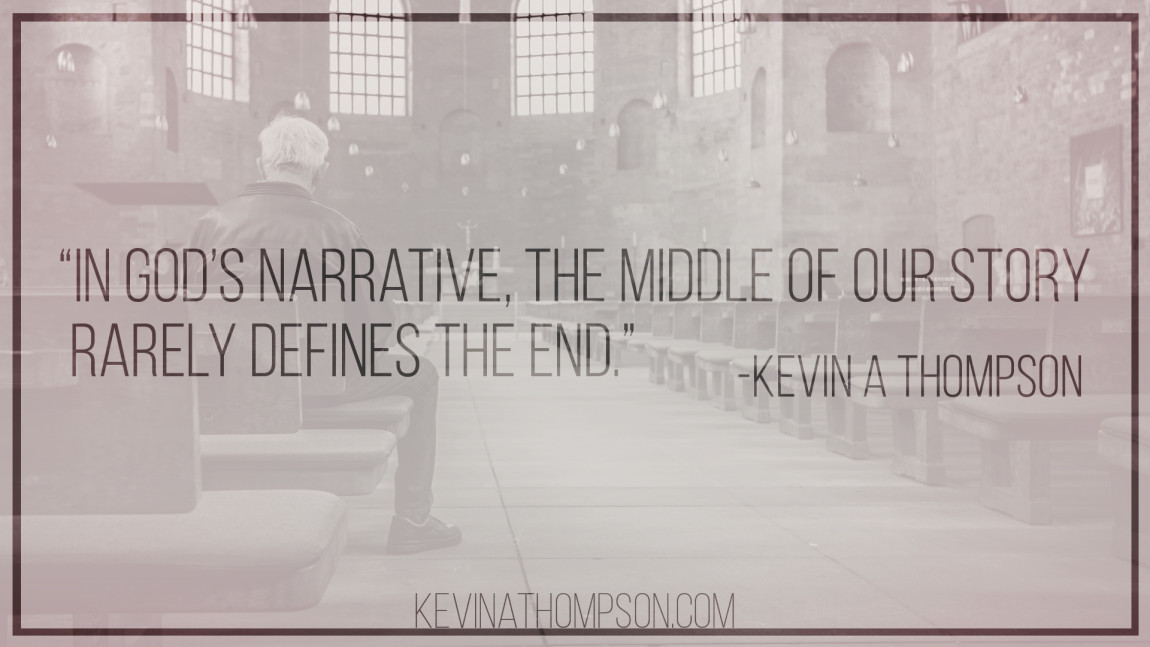We like to define people by their failure.
- “You know who that is?”
- “You heard what she did?”
- “Is that the one who did ____?”
It’s one of the reasons many people are terrified about a school reunion. We assume everyone will remember the stupidest thing we did. We fear they will remember because we still remember: the kid who threw up during third grade social studies, the girl who transitioned into womanhood during a school assembly, and our friend who totally struck out trying to ask the beauty queen to prom.
We define others by their failures, but God does not. (See: How to Come Back to Faith)
God has a pattern. It’s played out through the Old and New Testaments and seen in our lives today. In God’s narrative, the middle of our story rarely defines the end. Far more often, God surprises us by turning our circumstances upside down.
It’s not always the case. For some, the end of their story much resembles the messy middle. Unwilling to humble themselves, seek forgiveness, learn new patterns of behavior, or make different choices, their lives are determined by their worst mistakes. It’s humanity’s greatest fear come true. Some people will forever be defined by their darkest days.
Others experience the opposite reality. They make mistakes. They experience the shame and social isolation of failure. They allow pride to lead them astray, and they suffer the consequences of their mistakes. But they don’t stop there. Instead of allowing their lives to be determined by their worst decisions, they humbly seek God and allow him to write a different ending to their story.
As a pastor I hear their stories every day:
The man who thanks God for the day he was arrested because the arrest opened his eyes and forced him to his knees to ask for help. (See: A Dangerous Assumption About God’s Will)
The alcoholic who is grateful for the spouse who left her because without the reality of losing her family, she may have never have found sobriety.
The couple who, while telling their story of struggle, actually says they are thankful for the rocky times because God used it drive them toward one another.
In the middle of their story, any of these people would have been defined as failures. Failed marriages, businesses, dreams, relationships, and reputations. Yet before the final chapter of their lives were written, their failures turned into their greatest successes. They learned from their struggles, found healing, and used their experiences to help others in a similar spot.
For these people, their lives will be defined not by the middle of their story, but by the end–how God successfully used their failures.
How do you guarantee your life is not defined by your failure?
Consider your T.A.S.K.:
Take responsibility for your actions. As long as your are blaming someone else for your choices, you have no chance of moving past your failures. While the choices of others can have a tremendous negative impact on our lives, we choose how we respond to those things. Divide your actions from the actions of others and own what is yours.
Admit your need for help. If you could do it on your own, you already would have. You haven’t; so you need help. Admit it. Find a church, a sponsor, a small group, a counselor, and most importantly, admit your need for God.
Start making good decisions. No matter how you feel or what you think, consistently do the right thing time and time again. This is connected to admitting your need for help, because you won’t know the right thing to do by yourself.
Know you are headed the right direction in spite of what others say, and let that knowledge give you the determination not to give up. True change happens from the inside out. This means we will be going the right direction long before others see it. Don’t listen to the naysayers. Be convinced your new path is the right path.
We all experience failure. Yet our failures do not have define us. Instead, our failures can form the middle part of our story which God used to create a significant change in our lives. He can then use us to assist others as they go through similar circumstances.
Thankfully, in God’s narrative, the middle of our story rarely defines the end.




One Response to Your Story Can Be Bigger Than Your Failure